
Do NJ Firearm Owners Need a Gun Trust?
Learn about how a revocable trust can benefit you and your heirs.
By Elaine M. Cohen, Esq. On Apr 11, 2019In New Jersey, an heir or legatee can receive a firearm from a decedent by intestacy or under a last will and testament without any requirement to obtain a permit to purchase a handgun or a firearms purchaser identification card so long as that person is otherwise legally qualified to obtain such documents. The following prerequisites apply to obtain a permit or identification card:
- 18 years of age or older; and 21 or older for a handgun;
- Never convicted of any crime or a disorderly persons offense involving domestic violence;
- Not subject to a restraining order that prohibits the possession of a firearm;
- Not drug dependent;
- Never confined to a hospital, mental institution, or sanitarium for a mental disorder;
- Not be a habitual drinker;
- Not suffer from a physical defect or disease that makes him/her unsafe to handle a firearm;
- Never knowingly gave false information on an application for a permit to purchase a handgun or a firearms purchaser identification card;
- Can not refuse to waive the right of confidentiality for records from any institutional confinement.
- Police chief determination of no detriment to public health interest, safety and welfare for the applicant to possess a firearm.
In today’s society of gun violence prevalence, firearm enthusiasts are not looked upon in the same light as other collectors, like Jay Leno, with his impressive classic car collection. Thus, many firearm owners may consider creating a revocable trust to own the firearms collection. Privacy is a main benefit of such trust ownership. A revocable trust does not undergo probate upon an individual grantor’s death. There is no requirement to register the trust. Another benefit is that you cannot leave a firearm to a minor child. However, you can leave a firearms collection held in trust until the minor child reaches the age of majority.
The trust agreement should contain provisions regarding state and federal laws and trustee qualifications. A trustee of a revocable trust should be knowledgeable on how to legally transport, maintain and properly use firearms. Each trustee of a trust must be legally qualified to possess a firearm. A qualified trustee is a person who has not been convicted of a felony or misdemeanor under the domestic violence laws. A trustee can not be subject to a restraining order, use illegal drugs, or other unlawful substances or be illegally domiciled in the United States. It is always important to name a successor trustee. A trust should include broad powers for a trustee to complete any documents needed for registration, transportation and storage of the firearms.
About the Author
Elaine M. Cohen is an associate at Witman Stadtmauer, P.A. in Florham Park. Her practice focus is business law, M&A, buy/sell agreements, tax and estate planning.
To access more business news, visit NJB News Now.
Related Articles:




